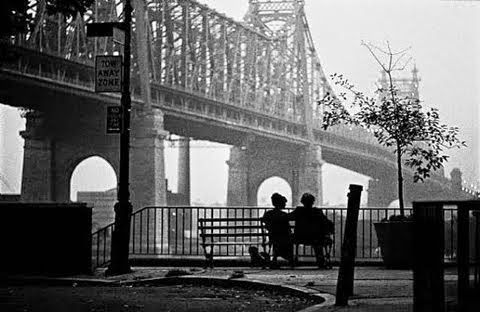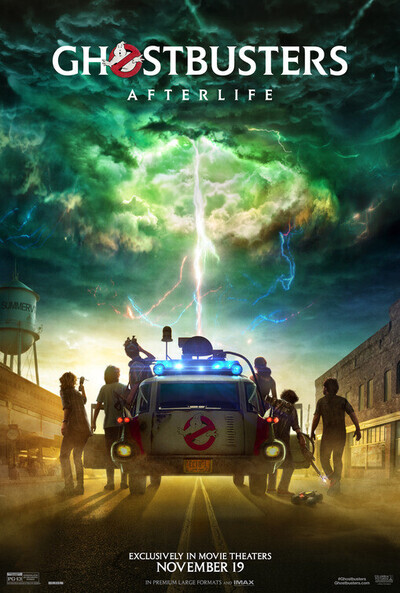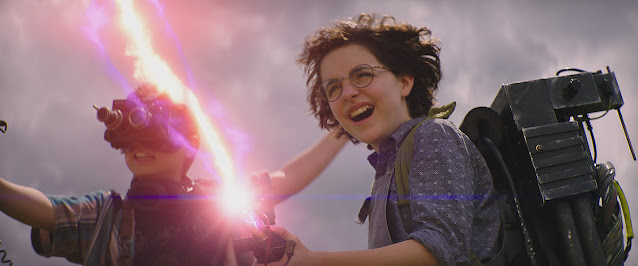A filmmaker realizing their "dream" project, like the one that is so very long in the making, can sometimes be a dicey proposition (of course there are exceptions like the ones that Scorsese eventually brings to fruition, but other times if a director has a "I've wanted to make this for 15-20 years it's more like, I dunno, Levinson's Toys or something). With Wenders got the core idea of Until the End of the World in 1977, before it was called that as the U2 song wasn't even a song (the band may not have even been a band yet), and inspired by being in Australia and what sort of concept could come from dreams being realized. By the time the film came to fruition, it wasn't released as he wanted at first - a mere piddling 158 minutes what he called the "Readers Digest" cut - and it wasn't till decades after that his full directors cut came to DVD and blu ray via Criterion. And lo and behold, its.... a helluva vision that's often quite arresting and absorbing and... good!
It's always an invigorating feeling to see a director completely in control of their creative faculties and using all of the collaborators at his side - Robby Muller in camera the number one (it may be one of his two or three greatest achievements, finding colors and compositions that can only come when one can, for lack of a better word, indulge in an epic scope and vision of cities and worlds and environments, including inside ourselves ultimately), but also actors like William Hurt and Max Von Sydow and Jeanne Moreau and Dommartin, who it's really her story ultimately (more on her in a bit), not to mention a returning face like Vogler or a new one like Sam Neill (also on narration and more on that too shortly), and more importantly than most other aspects, even the compelling production design and Just-Enough Futurish designs, is the music from Graeme Revell (getting to shine most past uh hour three) and the soundtrack from REM and Robby Robertson et al - and to follow this vision to allow it not only room to breathe but to evolve and take shapes one can't expect from a plot summary. There are times of course this feels long. Would I tell Wenders exactly where to cut? Would I dare? Um...
Once a creator is on a trek like this to make such a mammoth adventure cum Detective cum film noir cum "Road" cum science fiction apocalyptic story, it really takes on the qualities of a novel more than your traditional film. Indeed if it reminded me of anything it was how like Bergman indulged in some of his super long films (albeit it is not in the camp of capital M masterpiece like Fanny and Alexander I'd hope Wenders would take the compliment how rich and thick a text he's made in that similar vein), or Tarkovsky who was one of Wenders heroes.
And indeed Neill, as there's been in other films of this director's work, is a writer and takes the time of the Maybe This is the End Time to write his book once in Australia and settled into the world of the Dr Farber lab and the aborigines and their connections. How we construct a story takes time and the details matter, and I respect not just how much detail and time is given here but how moods can develop, like the music that the people end up making and collaborating on in this camp as it strikes a chord for the theme of what brings people together (those scenes may seem goofy considering they're right alongside serious Medical Experiment deep dives of the literal minds eye, but the juxtaposition isn't an accident either).
I think there's a part of me that wants to love this so wholeheartedly as it reveals more of the soul and spirit of a poet than a traditional storyteller always so concerned with plot; it's also great to see a filmmaker, unlike say Christopher Nolan, who can embrace showing us so much and allowing moments and character beats to breathe than for exposition to rule the day. But there are times when a performance will fall flat, likr I know he's supposed to be from another Wenders film and all but Allan Garfield in that car lot is just off even for this movie, or actually the background closest thing to uh "conflict" in a more mainstream sense that the government is after what the Farbers are doing with this innovative technology, is maybe raised once or twice (Ie oh no they're following Sam again and what's up with that raid and the guns drawn here and there), but it feels more like an after thought and the movie maybe could have worked more strongly without it.
The most hit and miss aspect that lowers my rating is the Narration. Neill isn't bad at it persay, but there's too much of it at some key points, in particular once things settle into that lab in Australia and he's writing the book, and where it actually feels right early on when it's more of a Hopping from Place to Place narrative it cuts in intrusively in parts later on when Wenders should trust more in the wild images (like those digital video animations that are disturbing and trippy and almost alluring in how warped they are, as if the Jupiter sequence from 2001 were on a computer not too far off from now in our consciousness). It's a hard thing because I know why it's there as it's adding to the novelist intent, but there's a fine line between adding to the moment and taking away from the dramatic portent or explaining what is already so clear and emotional.
But there is so much to this film that is so unique that I was very happy once it ended, even with reservations. It's is a major work that manages to explore like twenty or more things that I'm sure I'm not getting all into here. It explores obsession, addiction and grief with such delicacy and a rigor I'm not sure I've seen elsewhere from this director before or since, and yet the overriding issue connects with the idea at the heart of all this, which is what will bring us together as human beings and what will break us apart. Of course love and family and all that is paramount, with Moreau's mother a cornerstone of that, but I really liked where he takes the Von Sydow character as this brilliant but tragic figure, in some ways a classic Mad Movie Scientist but also a loving father and husband with a lot of baggage with his family.
And as for Dommartin, she grew on me as it went on reaching her highest points emotionally in the final half hour; I'd be lying if I said I was on board with all of her performance early on, but maybe it depended on what she had to work with in the scenes and I think the more serious things got and consequential she brought more of what she could do to the role. And Hurt is.... Hurt, and my God is he great in the scenes with Ozu regular Ryu. I could go on about this film, but the bottom line here is this is nearly 5 hours long, and it's.... a lot.
But it's not crafted by a director who, indulging as much as he is in what he loves to see, doesn't lose the pathos. It's not one of my very favorites on the level of Paris Texas, but it's remarkable all on its own and was most ahead of its time on how people become totally ensconced in image(s), when the word shouldn't be taken for granted... not that all images are condemned, as this is a gorgeous film to look at, more that... the medium is the message sort of thing.







































